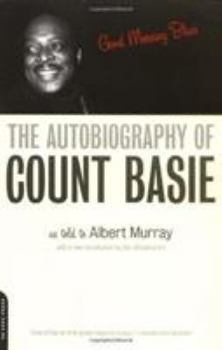Good Morning Blues: The Autobiography of Count Basie
Select Format
Select Condition 
Book Overview
Count Basie was one of America's pre-eminent and influential jazz pianists, bandleaders, and composers, known for such classics as "Jumpin' at the Woodside," "Goin' to Chicago Blues," "Sent for You... This description may be from another edition of this product.
Format:Paperback
Language:English
ISBN:0306811073
ISBN13:9780306811074
Release Date:April 2002
Publisher:Da Capo Press
Length:432 Pages
Weight:1.00 lbs.
Dimensions:1.1" x 5.6" x 8.5"
Customer Reviews
2 ratings
Basie the cool professional, Murray the former general
Published by Thriftbooks.com User , 19 years ago
This is a particularly useful book if you know basie, Basieism and what is happening already. Count Basie never was the kind of person you would expect to write a tell all, or note how much reefer was being smoked like Buck Clayton did in his memoir, or spill the inside dope on John Hammond as a number of Basieites have in their books and interviews. Basie has always been a cool professional, concerned with handling the business side, keeping everybody happy, and keeping the ship above the water. He goes by the old watchword from the 50s we used to have "Maintain your cool at all times." Thus we get a memoir that has a lot of places and names in it, a lot about working in the band, but very little that is going to surprise or wow anyone who isn't into the Basie story. He stays pretty close to the vest, and presents a very easy going story. One example of how this book smoothes over conflict and controversy and makes everything seem smoother than the truth is how it treats the departure of Claude Fiddler Williams from the Basie Band in 1937. While the ignorant think Freddie Green was Basie's only guitarist, Williams was the band's first guitarist--and he was Downbeat guitarist of the year that year--and also played hot jazz fiddle solos with the band. Only the Live at the Chatterbox recording lets you hear his brilliant fiddling. When the band arrived in New York, John Hammond who acted like manager, director, and overlord over the band for years, decided the Fiddler's violin was too "country" and replaced him with Freddie Green who was playing in a New York Club when Basie arrived in the Apple. Williams who lived until last year (2004) always said John Hammond fired him, although he says he felt grateful in the end because his career as an independent fiddle soloist would have never taken off had he stayed with Basie. In this book, Basie says that he and Williams came to a friendly parting of the ways that let Williams become independent. There is lots of smoothed over stuff like this. To be fair, this was more or less of an interview with an aging Basie with little attempt to research things. Many things get hazy or are remember conveniently as the years pass on, as I am coming to realize myself as I enter my late 50s. The book also suffers from Albert Murray's interviewing. Murray never presents his credentials in his appearances as an "expert" on Jazz. In fact he is a retired Air Force General and has never been a musician, a musicologist, or anything professionally associated with music. He's imposed his own rather conservative viewpoint on Jazz as the all American capitalist product, rather than an expression of Black culture, oppression, and a struggle to Africanize music. Rather, Murray priviledges a progression to take Jazz closer to the forms of European classical music. So, it is no surprise that Murray isn't going to try to ferret out controversy, difficult truthes, or unconventional behavior, p
Good Morning Blues, Blues How Do You Do?
Published by Thriftbooks.com User , 22 years ago
This book contains a wealth of historical information, and is written in a calm, mellow style. Murray perfectly captured the laid-back elegance of Basie's voice and tells his story in a smooth, graceful manner. This book contains no sensational or scandalous materials about Basie's many associates, including Lester Young, Billy Holiday, Frank Sinatra, or Benny Moten, and that's the way Basie wanted it. Basie was a gentleman who believed in proper decorum, and he never revealed any secrets about his many friends. There are no bombshells in this book, but if you are looking for a comprehensive life story of one of the 20th century's most important and succesful musicians (both commercially and artistically), this is the book for you. This is an absolute neccesity for students of jazz and is essential to any collection of jazz biographies. The information on the music alone (where they were touring, what they were playing, when they recorded what, etc.) is vast.





